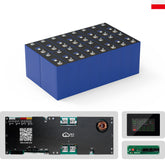Forklift Battery Voltage Explained 12V or 24V
When it comes to forklift batteries, understanding the voltage is crucial for selecting the right type for your equipment. Forklift battery voltage can vary, with the most common configurations being 12V and 24V systems. In this article, we will dive deep into forklift battery voltage, comparing the differences between 12V and 24V systems and helping you determine which one is best for your needs. Whether you are new to forklifts or looking to upgrade your equipment, understanding forklift battery voltage will make your decision easier.
- What Is a Forklift Battery?
- The Basics of Forklift Battery Voltage
- Forklift Battery 12V vs. 24V: Key Differences
- How to Choose Between Forklift Battery 12V and 24V
- Forklift Battery 12V vs. 24V: Efficiency and Cost
- How Forklift Battery Voltage Affects Maintenance
What Is a Forklift Battery?
A forklift battery is a key component that powers the forklift's electric motor. It stores and supplies electrical energy, allowing the forklift to move and perform various tasks in a warehouse or industrial setting. Forklift batteries are typically rechargeable, and their voltage is a major factor in determining how much power the forklift can generate and how long it can operate before needing a recharge.
The Basics of Forklift Battery Voltage
Forklift batteries come in various voltages, but the most common are 12V and 24V systems. The voltage refers to the electrical potential difference between two points in the battery. This potential drives the current through the forklift’s motor, enabling movement and other functions. Understanding forklift battery voltage is crucial to ensuring your forklift operates at peak efficiency.
In a 12V forklift battery, there are six 2V cells connected in series, whereas in a 24V battery, you will find twelve 2V cells connected in series. Higher voltage batteries generally allow for higher power output, which can be important for heavier loads and larger operations.
>>See also Does It Matter Which Battery You Use in a Lawn Mower
Forklift Battery 12V vs. 24V: Key Differences
Forklift Battery 12V Overview
A 12V forklift battery is a more basic and straightforward option. It typically suits smaller, lighter forklifts or situations where the load requirements are not particularly heavy. These batteries are common in small warehouses or environments where forklifts don’t need to carry heavy loads or operate for long periods without recharging.
Advantages of 12V Forklift Batteries:
1. Cost-Effective: 12V batteries are generally less expensive than their 24V counterparts.
2. Simplicity: These batteries are simpler to maintain and replace.
3. Ideal for Smaller Applications: 12V systems are suitable for light-duty forklifts or those used in environments where the demands on the battery are relatively low.
Disadvantages of 12V Forklift Batteries:
1. Limited Power: These batteries may not provide enough power for larger or more demanding forklifts.
2. Shorter Runtime: They generally provide shorter operational times compared to 24V systems.
Forklift Battery 24V Overview
On the other hand, 24V forklift batteries are used in larger, more powerful forklifts. These systems are designed to handle more demanding tasks, such as lifting heavier loads or operating in more rigorous environments. They typically have a longer runtime and are better suited for industrial settings.
Advantages of 24V Forklift Batteries:
1. Higher Power Output: 24V batteries are ideal for larger forklifts or operations that require more power.
2. Longer Runtime: These batteries generally last longer on a single charge, reducing downtime for recharging.
3. Better for Heavy Lifting: If your forklift needs to lift heavy loads or operate for long periods, a 24V battery is usually the better choice.
Disadvantages of 24V Forklift Batteries:
1. Higher Initial Cost: 24V systems tend to cost more upfront, both in terms of the battery itself and the charging equipment required.
2. More Maintenance: These batteries may require more maintenance and monitoring to ensure they stay in good working condition.
How to Choose Between Forklift Battery 12V and 24V
When deciding between a 12V or 24V forklift battery, consider several factors, including your forklift’s size, weight, and workload. Here's a quick guide to help you make an informed decision.
1. Consider the Size and Weight of the Forklift
If you're using a smaller forklift or one that doesn’t need to handle heavy lifting tasks, a 12V forklift battery may be enough. However, if you're operating a larger forklift that will be lifting heavier loads, you’ll likely need a 24V system for optimal performance.
2. Evaluate the Operational Time
For longer shifts and heavier loads, a 24V forklift battery will provide a longer runtime, reducing the need for frequent recharges. If your operations require shorter periods of forklift use, a 12V battery could be sufficient.
3. Assess the Type of Operation
Consider the type of tasks your forklift will be used for. If it’s mostly light indoor work, a 12V forklift battery may be the best choice. For outdoor or industrial environments with more strenuous tasks, opt for a 24V battery.
Forklift Battery 12V vs. 24V: Efficiency and Cost
Cost Efficiency
While 12V forklift batteries are less expensive to purchase, 24V forklift batteries may be more cost-efficient in the long run due to their longer lifespan and the ability to handle more demanding tasks. For businesses that require heavy-duty forklifts, the higher upfront cost of a 24V system could be offset by the benefits it provides in terms of runtime and power output.
Energy Efficiency
The energy efficiency of a forklift battery depends on its size, capacity, and the forklift’s power requirements. Generally, 24V forklift batteries are more energy-efficient than 12V systems for larger forklifts due to their ability to store more power and operate for longer durations.
>>See also What is the Difference Between a Dual Battery and an Auxiliary Battery
How Forklift Battery Voltage Affects Maintenance
The voltage of your forklift battery also plays a role in how much maintenance it requires. Higher voltage batteries, like 24V systems, often require more sophisticated charging equipment and maintenance practices to ensure longevity. This may include regularly checking the water levels and ensuring the cells are properly balanced.
For 12V forklift batteries, maintenance is generally simpler and less frequent, as the system is less complex and the equipment required for charging is more widely available. However, they still require routine maintenance, including checking for signs of wear or leaks.
In summary, choosing between a 12V and 24V forklift battery depends on the needs of your business and the specific forklift applications. Forklift battery voltage plays a significant role in determining the power output, runtime, and efficiency of the equipment. While a 12V battery is ideal for smaller, lighter applications, a 24V battery is better suited for heavy-duty lifting and longer operational periods. Understanding these differences will help you select the best forklift battery voltage for your needs.
If you’re still unsure which forklift battery is right for your operation, it’s always a good idea to consult with a battery specialist or forklift dealer to assess your specific requirements. By doing so, you’ll ensure that your forklift operates efficiently, effectively, and for as long as possible.
























Leave a comment
All blog comments are checked prior to publishing